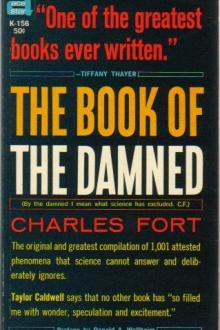Genre Literary Criticism. Page - 1
No registration or authorisation! And it is all for free!

all the parts of thewatch to the function, or purpose, of showing the time, is held to beevidence that the watch was specially contrived to that end; on theground, that the only cause we know of, competent to produce such aneffect as a watch which shall keep time, is a contriving intelligenceadapting the means directly to that end.Suppose, however, that any one had been able to show that the watch hadnot been made directly by any person, but that it was the result ofthe modification of another

the delicate curvesof the shell reflect sounds and harmonies too faint to be otherwisenoticed. A hundred men may pass a hayfield and see only the sweaty toil andthe windrows of dried grass; but here is one who pauses by a Roumanianmeadow, where girls are making hay and singing as they work. He looksdeeper, sees truth and beauty where we see only dead grass, and he reflectswhat he sees in a little poem in which the hay tells its own story:Yesterday's flowers am I,And I have drunk my last sweet

lded merit.Inevitably, since the industrial revolution, modernist critics havetended to stress its appeal to class consciousness. This appeal, realthough it is, can be overemphasized. The rude forefathers are notprimarily presented as underprivileged. Though poverty-stricken andignorant, they are happy in family life and jocund in the field."Nature is nature wherever placed," as the intellectuals of Gray'stime loved to say, and the powers of the village fathers, potentially,equal the

his statements, is hopelessly vain.It is all undeniable, no doubt; from every side we make out that the criticism of a book--not the people in the book, not the character of the author, but the book--is impossible. We cannot remember the book, and even if we could, we should still be unable to describe it in literal and unequivocal terms. It cannot be done; and the only thing to be said is that perhaps it can be approached, perhaps the book can be seen, a little more closely in one way than in

ken in the history of theworld. The South Gardens adjoin the Avenue of Palms and extend to theExposition enclosure along the south boundary line, where a wall fiftyfeet high and ten feet wide has been erected of a solid green moss-likegrowth, studded with myriads of tiny pink star-like blossoms. This greatwall is perforated by simple arched masonry entrances, leading rough therichly planted foreground formed by the South Gardens.Basins of reflecting blue waters extend to the right and left of

e city council was backed by a large body of serious opinion throughout the country. A proof of this, if proof were needed, is to be found in the circumstances that gave rise to the Apologie of Sidney.The attack on the stage had been opened by the corporation and the clergy. It was soon joined by the men of letters. And the essay of Sidney was an answer neither to a town councillor, nor to a preacher, but to a former dramatist and actor. This was Stephen Gosson, author of the School of Abuse.

at he is hardly even a caricaturist; that he is something very like a realist. Those comic monstrosities which the critics found incredible will be found to be the immense majority of the citizens of this country. We shall find that Sweedlepipe cuts our hair and Pumblechook sells our cereals; that Sam Weller blacks our boots and Tony Weller drives our omnibus. For the exaggerated notion of the exaggerations of Dickens (as was admirably pointed out by my old friend and enemy Mr. Blatchford in a

nd albeit they all leade us with a common accord to despise povertie, and other accidental! crosses, to whichOmnes eodem cogimur, omnium Versatur urna, serius, ocius Sors exitura, et nos in aeternum Exilium impositura cymbae, [Footnote: Hor. I. iii. Od. iii. 25.] All to one place are driv'n, of all Shak't is the lot-pot, where-hence shall Sooner or later drawne lots fall, And to deaths boat for aye enthrall. And by consequence, if she makes us affeard, it is a continual subject of torment, and

he same goal.As to physical things, chemic, mineralogic, astronomic, it is not customary to say that they act to achieve Truth or Entity, but it is understood that all motions are toward Equilibrium: that there is no motion except toward Equilibrium, of course always away from some other approximation to Equilibrium. All biologic phenomena act to adjust: there are no biologic actions other than adjustments. Adjustment is another name for Equilibrium. Equilibrium is the Universal, or that which

This "borrowing" was nothing unique, either for Disney or for the industry. Disney was always parroting the feature-length mainstream films of his day.3 So did many others. Early cartoons are filled with knockoffs--slight variations on winning themes; retellings of ancient stories. The key to success was the brilliance of the differences. With Disney, it was sound that gave his animation its spark. Later, it was the quality of his work relative to the production-line cartoons with